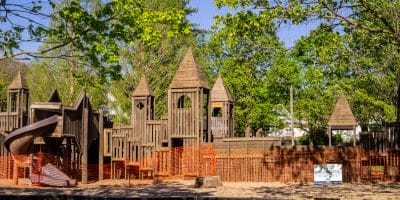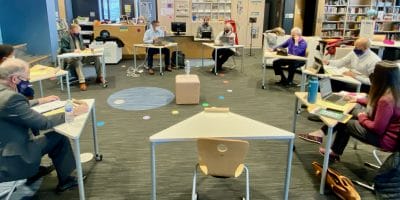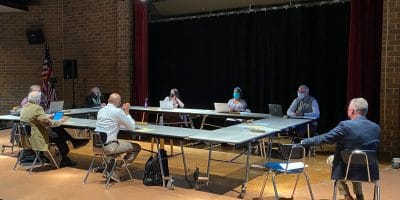By Sky Wilson, contributor
In a Board of Visitors meeting and press release Friday, JMU announced that is is proceeding with plans to resume in-person classes on Oct. 5, following a temporary suspension of classes for most of September.
Addressing the board on Friday afternoon, President Jonathan Alger said most students who contracted COVID-19 experience either no or only mild symptoms. Alger also said that students who were sick or quarantined were not sent home to spread the virus, and all others who did go home were asked to quarantine for 14 days. He also apologized to all affected in the first outbreak.
The university’s reopening plan includes a mandatory surveillance testing program, in which it will test 300 randomly selected, non-symptomatic students who have not previously tested positive for COVID-19 each week.
Vice President for Student Affairs Tim Miller told the board on Friday that JMU has also increased its quarantine capacity, with more than 400 beds now available, plus expanded “quarantine-in-place” resources in on-campus housing. He said the university has “bought out a whole hotel” to provide quarantine space.
Miller also told the board he felt “really good” about the number of beds the university has obtained, but still wants to “feel better.” He hopes to eventually have at least 450 quarantine beds available.
When in-person instruction resumes on Oct. 5, classes with more than 50 students must be taught online or in the hybrid format, according to the press release. Additionally, the fall break scheduled for Oct. 22-23 has been canceled to limit student travel, and after Thanksgiving break in November, all courses and exams will move online for the remainder of the semester. All exams will be taken online.
Heather Coltman, provost and senior vice president for academic affairs, told the board that faculty remain “very motivated” to maintain interactive courses that despites changes to instructional format.
The university has also created a Scientific & Public Health Advisory Team consisting of 19 people with science or public health backgrounds to help make strategic decisions regarding the pandemic, and will implement operational changes in the health center and dining halls.
Those changes include expanded hours at the University Health Center and additional access to flu shots. In the dining halls, new measures include changes to queuing and seating areas to help with the flow of traffic and social distancing.
Miller told the Board of Visitors that he is confident that the university can handle a second wave in October or November.
“We’ve seen our peak, and I hope that’s the only peak,” he said.
University leaders expressed confidence in the university’s ability to manage students’ return to campus based on shifts in students’ perspectives.
“While there continues to be some concerning gatherings of students, most students have changed their behavior significantly, and if they are still gathering, it has tended to be in small groups,” reads the press release.
More than 200 cases against students who “made poor choices” are currently being investigated by the Office of Student Accountability and Restorative Practices.
Miller emphasized that this accountability will continue when students return, and reported to the board that more than two dozen students have had their exemption to stay on campus during the closure rescinded for hosting gatherings in on-campus housing since September 5.
JMU has received mixed press since August when students returned to campus. In one notable incident on Sept. 1, a student posted a video of his crowded classroom to Twitter. The video received more than 17,000 views and was reported on by local media. Coltman said that crowded classrooms were not an issue “pervasive on campus” and that this specific instance was addressed immediately.
Miller told the board that there has been zero evidence of transmission between students and faculty or staff. They consider their classrooms “safe.” The decision to remove students from campus occurred when on-campus quarantine isolation beds began to run out and the virus began to touch residence halls.
The viral outbreak on the JMU campus has reportedly had no effect on area hospitals. A majority of students have not required medical attention beyond COVID-19 testing, according to the University Health Center.
“There’s an emotional issue that’s hard to get through when it comes to communication no matter how many times you say it,” Nick Langridge, Vice President of University Advancement, told the board of visitors on Friday.
Enrollment at JMU is reportedly down by at least 670 students. Combined with the loss of auxiliary revenues from things like on-campus housing, dining services, parking, and on-campus purchases, this presents budgetary challenges for the university, Senior Vice President of Administration and Finance Charles King Jr. told the board. By June 2021, he said action will need to be taken to address potential shortfalls caused by the ongoing pandemic, changing enrollment patterns, potential shifts to instructional delivery, and a general economic downturn.
Publisher Bridget Manley contributed reporting to this story.
Journalism is changing, and that’s why The Citizen is here. We’re independent. We’re local. We pay our contributors, and the money you give goes directly to the reporting. No overhead. No printing costs. Just facts, stories and context. We’re also a proud member of the Virginia Press Association. Thanks for your support.












